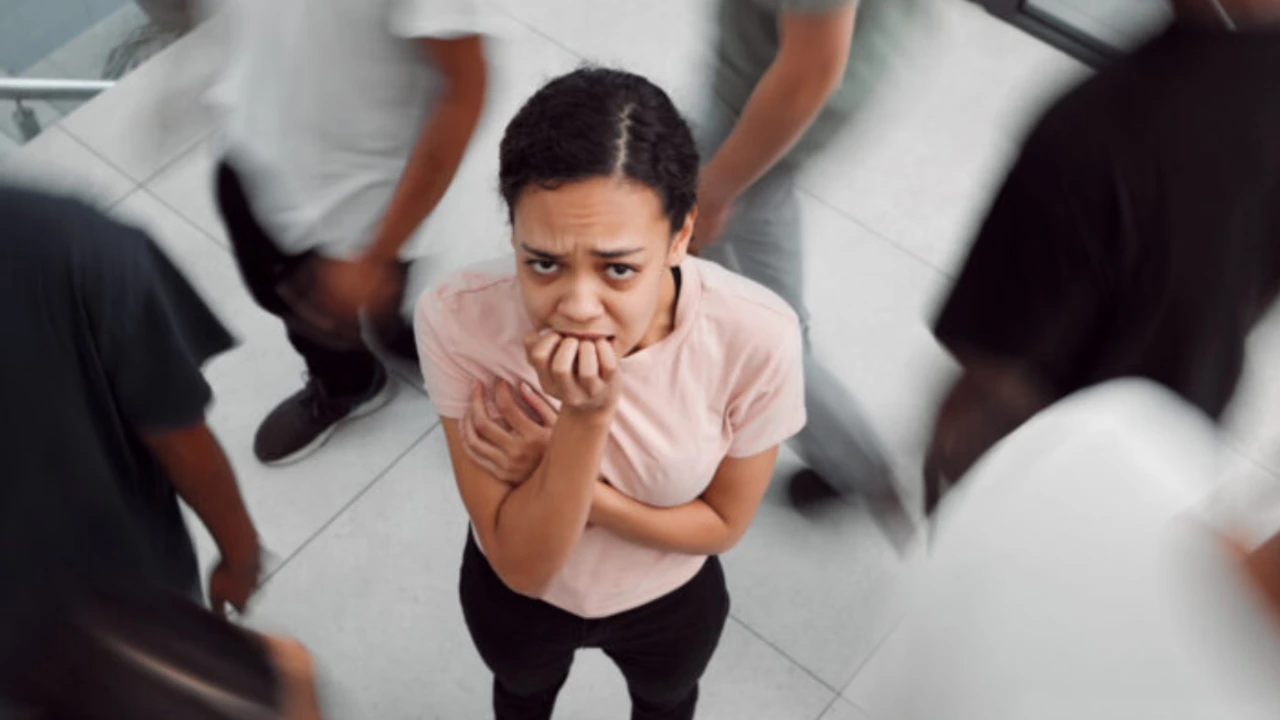Agoraphobia or agoraphobia is an excessive fear or anxiety of a place or situation that makes the sufferer feel panicked, trapped, helpless, or ashamed. Generally, agoraphobia arises when the sufferer travels or is in public places, especially crowded ones.
A phobia is a condition when a person experiences an excessive fear reaction to something. The fear can be caused by various things, for example some people feel afraid of a condition or situation, such as crowds, and some people also feel afraid of more specific things, such as blood or certain animals.
Sufferers of agoraphobia will feel excessive fear and anxiety in several places and conditions, such as public places, closed rooms, crowds, outdoor environments, and public transportation. As a result, the life of agoraphobia sufferers risks becoming very limited and isolated.
Causes of Agoraphobia
The exact cause of agoraphobia is not yet known . However, this condition generally arises when a person has experienced more than one panic attack in a certain place or condition. This causes agoraphobia sufferers to fear and avoid the place or condition.
Agoraphobia can be experienced by a person since childhood, but this condition occurs more often in teenagers or young adults (less than 35 years old). In addition, agoraphobia is also more often found in women compared to men.
Risk factors for agoraphobia
There are several factors that can increase a person’s risk of agoraphobia , namely:
- Feeling afraid of being the victim of a criminal act, having an accident, or contracting a certain disease
- Having trauma to events that have been experienced, such as losing a family member or experiencing torture
- Having an unhappy relationship with a partner, for example because the partner is too restrictive
- Have suffered from other mental disorders, such as depression, bulimia, or anorexia nervosa
- Suffering from a disorder in the part of the brain that controls fear
- Suffering from other types of phobias
- Having an easily anxious and nervous nature
- Have a family member who suffers from agoraphobia
Symptoms of Agoraphobia
The main symptom of agoraphobia is a feeling of fear and anxiety that arises when every sufferer thinks about, experiences, or is in a certain place or condition, such as:
- Being outside the house alone
- Being in a large or open space, such as a parking lot, park, or large mall
- Being in a closed space, such as a cinema, meeting room, or elevator (elevator)
- Queuing or being in the middle of a crowd of people
- Using public transportation, such as buses or trains
The fear and anxiety experienced by sufferers will generally cause physical, cognitive (thought patterns), and behavioral symptoms. The following is an explanation of the three symptoms:
Physical symptoms
The anxiety and fear experienced by agoraphobia sufferers can cause a variety of physical symptoms similar to panic attacks, such as:
- Chest pain
- Heart pounding
- Rapid breathing (hyperventilation)
- Trembling, numbness, or tingling
- The body feels hot and sweaty
- Mild headache or dizziness
- Tinnitus
- Stomach pain, nausea, or diarrhea
- Difficulty swallowing or choking
- Feeling unwell or fainting
Cognitive symptoms
In addition to physical symptoms, agoraphobia sufferers can also experience cognitive symptoms, including:
- Feeling embarrassed or looking stupid in front of others
- Feeling nervous and trembling when others stare
- Feeling unable to escape from a place or situation during a panic attack
- Can’t think clearly when in public
- Having a panic attack that can make you short of breath or your heart stop beating
Behavioral symptoms
Fear and anxiety experienced by agoraphobia sufferers can also cause behavioral changes, such as:
- Avoiding situations that are prone to causing panic attacks, such as being in public transportation, queues, or crowded places
- Avoid traveling outside the home for a long time
- Need a companion to go outside the house
- Feeling afraid to leave the house
When should you go to the doctor?
Check yourself with a doctor if you experience the above symptoms, especially when the symptoms often appear and are very disturbing for you to socialize, work, or do other daily activities. A doctor’s examination should also be done immediately if there is a desire to injure oneself or commit suicide.
Diagnosis of Agoraphobia
To diagnose agoraphobia , the doctor will ask about the symptoms experienced by the patient. Physical examinations and supporting examinations, such as blood tests, will only be performed to ensure that the symptoms experienced are not caused by other diseases.
Based on the criteria in DSM-5 (The Diagnostic and Statistical Manual of Mental Disorders, 5th Edition) , a person can be diagnosed with agoraphobia if they experience fear or anxiety for at least 6 months in two or more of the following situations:
- Being in an open space, such as a parking lot or shopping center
- Being in an enclosed space, such as a movie theater or elevator
- Standing in line or being in a crowd
- Using public transportation
- Alone when outside the house
Treatment of Agoraphobia
Agoraphobia treatment aims to relieve fear and panic, as well as teach patients how to control themselves well when thinking about or facing the feared situation. Here are some treatment methods that can be done:
Psychotherapy
Counseling with psychologists and psychiatrists can help patients deal with their fears. Some types of psychotherapy that can be done to deal with agoraphobia are:
- Cognitive behavioral therapy or cognitive behavioral therapy (CBT), to make patients more confident, brave, and think positively about situations or places that are feared
- Exposure therapy (desensitization), to reduce the fear experienced and consider something feared as normal
- Relaxation therapy, to relax the muscles, as well as reduce the level of tension experienced when faced with a feared situation
Medicines
Medicines are used to deal with complaints and symptoms that appear when patients experience agoraphobia . Medicines used include:
- Serotonin binding inhibitors (SSRIs), serotonin-norepinephrine reuptake inhibitors (SNRIs), or pregabalin , to relieve anxiety disorders and improve mood
- Benzodiapine , to treat severe acute anxiety disorders
It should be remembered, always follow the recommendations for the use of drugs that have been prescribed by the doctor. Do not stop taking or change the dose of the drug without consulting a doctor first.
Self-help program
This program aims to help patients to be able to control their response to things that cause panic or stress. This program consists of:
- Living a healthy lifestyle, such as getting enough sleep , consuming nutritious food, and reducing the consumption of caffeinated or alcoholic foods and drinks
- Doing relaxation , such as breathing techniques to help patients relax more when dealing with agoraphobia triggers
- Exercising regularly, in order to increase the chemicals in the brain that play a role in regulating mood
- Divert your mind from the thing or situation you are afraid of, for example by looking at the movement of the clock hands or imagining positive things until the feeling of panic disappears
- Try to stay still and not run to a safe place when a panic attack occurs, to change the patient’s mindset towards the feared place or condition
- Join a group of agoraphobia sufferers , to share experiences and ways to overcome anxiety due to agoraphobia
Complications of Agoraphobia
Severe agoraphobia that is not treated can make the sufferer always afraid, anxious, and panic when thinking about, experiencing, or being in the feared place and situation.
This can certainly affect the quality of his life. Sufferers may not want to leave the house for normal activities, such as going to school or working in the office. As a result, sufferers are at risk of experiencing decreased performance and financial difficulties, as well as becoming dependent on others.
In addition, agoraphobia can make sufferers more prone to experience:
- Depression
- Mental disorders, such as anxiety disorders
- Alcohol dependence
- Abuse of NAPZA
- Self isolation
- Suicide attempt
Prevention of Agoraphobia
Until now, no sure way to prevent agoraphobia has been found . However, there are several ways that can be done to reduce the intensity of anxiety and fear that appears, namely:
- Don’t avoid going somewhere or doing certain things that are actually safe and normal.
- Slowly train yourself to go to the places you are afraid of.
- Talk to and ask for help from family or close friends to help you overcome anxiety.
- Consult a doctor so that the agoraphobia you experience does not get worse and becomes more difficult to treat.
References :
Chawla, N., et al. (2022). Drug Treatment for Panic Disorder With or Without Agoraphobia: Systematic Review and Network Meta-analysis of Randomized Controlled Trials. British Medical Journal, 376, pp. e066084.
Meijers, S., et al. (2020). Coping in Chronic Tinnitus Patients. Frontiers in Neurology, 11, pp. 1460.
Teismann, T., et al. (2018). Suicidal Ideation in Primary Care Patients Suffering from Panic Disorder With or Without Agoraphobia. BioMed Central Psychiatry, 18(1), pp. 1–5.
Better Health (2020). Anxiety. Agoraphobia.
National Health Service (2018). Mental Health. Agoraphobia.
National Institute of Health (2020). Medline Plus. Agoraphobia.
Cleveland Clinic (2020). Diseases & Conditions. Agoraphobia.
Mayo Clinic (2022). Diseases & Conditions. Agoraphobia.
Barnhill, J. MSD Manual (2020). Agoraphobia.
Cherry, K. Verywell Mind (2020). Phobia Symptoms, Types, and Treatment.
DiLonardo, M. WebMD (2020). Agoraphobia.
Fritscher, L. Verywell Mind (2022). What are the Symptoms of Agoraphobia?
Kivi, R. Healthline (2018). Agoraphobia.
Star, K. Verywell Mind (2022). What is Agoraphobia?

